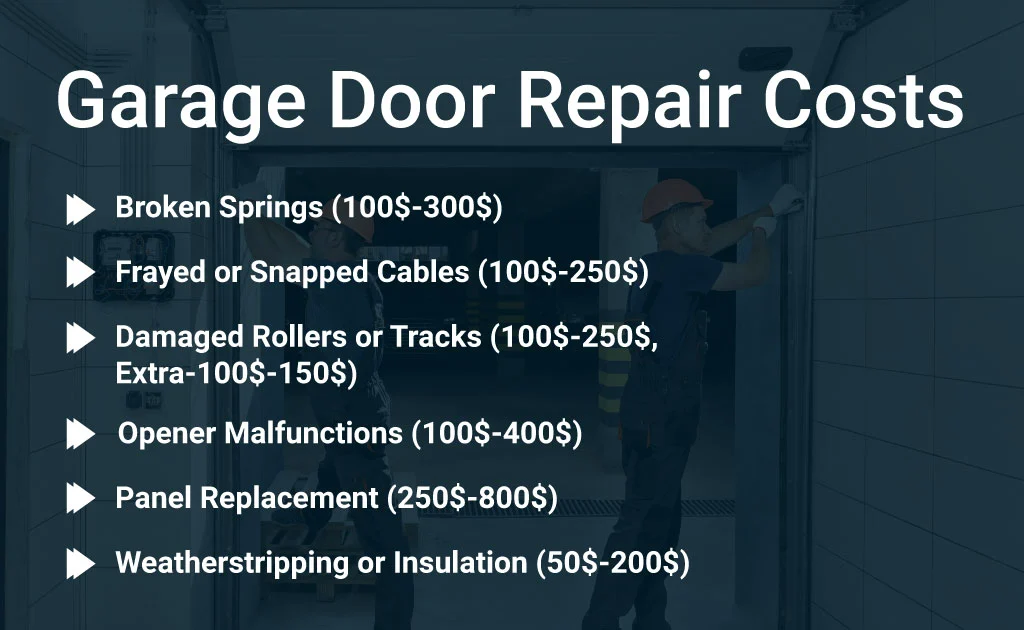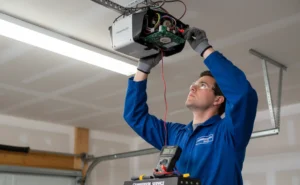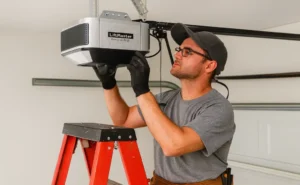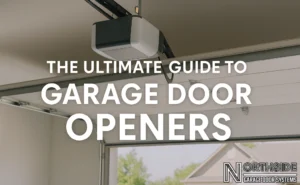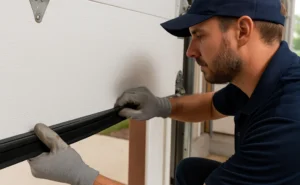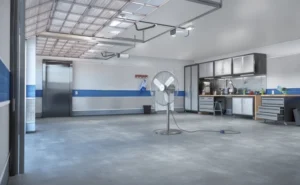If you’ve ever found yourself wondering, “How much does garage door repair cost?” you’re not alone. Garage doors are not only a major focal point of your home’s exterior but also a critical component of your home’s security—protecting your vehicles, tools, and personal belongings. While they’re built to be durable, garage doors can be damaged fairly easily, and over time, wear and tear can lead to issues ranging from faulty sensors to broken springs.
The good news is that garage door repairs are among the more affordable home repairs per square foot, with costs typically ranging from as low as $80 to as high as $700. On average, homeowners spend around $264 per repair, which gives you a general idea of the garage door repair price in most areas. From broken springs and frayed cables to damaged rollers, opener malfunctions, panel replacements, and even weatherstripping issues—each type of repair comes with its own price range.
In this article, we’ll break down the key factors that influence garage door repair costs, highlight common repair scenarios, and share budgeting tips. By the end, you’ll know what to expect when deciding between tackling repairs yourself or hiring a professional.
Keeping your garage door in good condition means more than just aesthetics—it’s also a safety and security measure for your home. When you consider garage door repair costs, also remember to think about both the pieces and labor involved.
Typically, a garage door assembly includes panels, rollers, cables, tracks, springs, and a garage door opener. However, of these components, the installation cost of the garage door opener is the highest. For homeowners dealing with opener issues, knowing the average garage door opener repair cost can help plan ahead. If any of these components malfunction, the total expense will reflect both the cost of replacement parts and the time spent by a technician to diagnose and resolve the issue.

- Garage Door Replacement Parts: Springs, rollers, and cables have shorter lifespans when compared to other components, which is why they’re among the most frequently replaced parts.
- Labor Charges: Experienced technicians charge for diagnostic work, emergency services, and sometimes even higher fees for weekend or evening calls.
- Garage Door Repair vs. Replacement: If a door is significantly damaged (e.g., from a collision or extreme weather), the cost to repair might come close to the price of a replacement. In this case, whether you use an insulated or non-insulated garage door plays a big role in the price of your garage door. Evaluating the condition of the door helps you decide whether investing in repairs is worthwhile or whether full replacement is more cost-efficient.
Understanding these basics helps you gauge “How much does garage door repair cost?”for common issues, and sets the stage for analyzing what drives those costs up or down.
Factors Influencing Garage Door Repair Costs
| Door Material | Wooden doors may require specialized treatments or coatings, while steel doors often need rust-proofing or dent repairs. |
| Door Size and Weight | Larger, heavier doors require sturdier components. This can drive up the cost of the parts and labor involved in repairs. |
| Degree of Damage | Minor dents and misalignments are less expensive to fix compared to significant structural or motor damage. |
| Age of the Door | Older doors might need components that are no longer in production, which can lead to pricier custom solutions. |
| Location and Labor Rates | The going rate for professional help varies by region. Urban areas often have higher labor costs, but they may offer a wider selection of service providers. |
| Urgency of Repair | If you need a technician to come over at night, on a holiday, or for a same-day emergency repair, expect extra fees. |
By assessing these garage door repair factors in advance, you’re better prepared for what to expect when you get an accurate garage door repair estimate or service quote.
How Much Does Garage Door Repair Cost? -Common Repair Expenses
You may still be wondering, ”How much does garage repair cost?” in practical terms, so let’s get into the numbers. Below, I’m sharing some of the most common garage door repairs and their typical price ranges to give you anidea of what your situation might be:
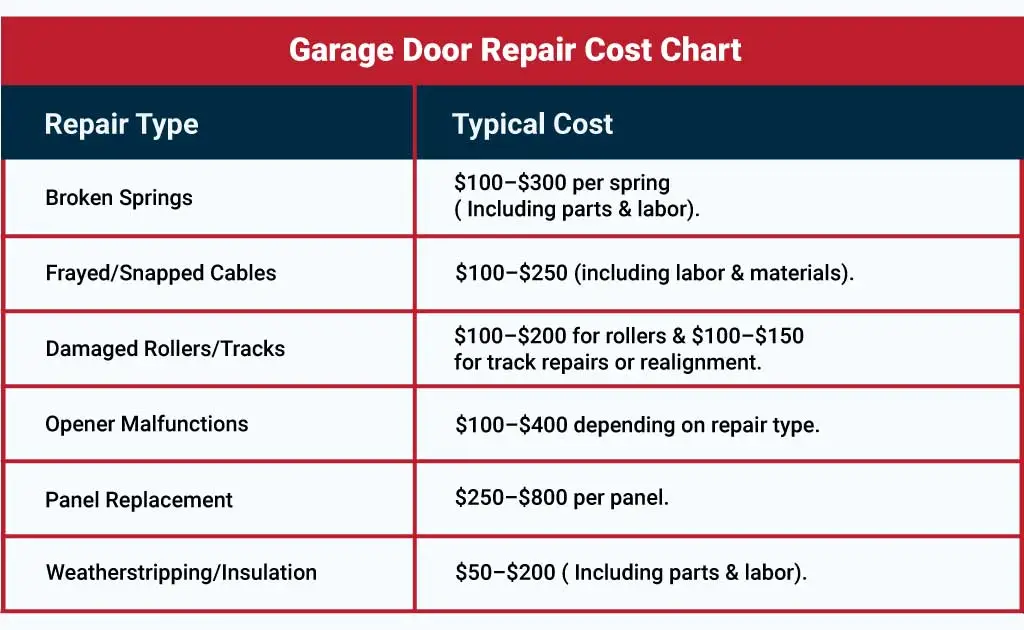
Broken Springs
- Springs do the heavy lifting each time you open or close your garage door.
- Typical Cost: Anywhere from $100 to $300 per spring (including parts and labor). High-tension torsion springs usually cost more than extension springs.
Frayed or Snapped Cables
- Cables help lift and lower the door. When they’re worn out, the door can get stuck or get uneven.
- Typical Cost: It ranges from $100 to $250, including in labor costs and materials.
Damaged Rollers or Tracks
- Rollers guide the door on the track. If they get damaged, they can cause irregular movement or unbalance the door.
- Typical Cost: $100 to $200 per set of replaced rollers; if the track is bent, add an extra $100 to $150 for repairs or realignment. In fact, the garage door off track repair cost is one of the most common unexpected expenses homeowners face.
Opener Malfunctions
- Issues with sensors, remotes, or the motor can disrupt automatic door functions.
- Typical Cost: $100 to $400, depending on whether you only need a sensor replacement or a full motor repair.
Panel Replacement
- A dented or rusted panel compromises aesthetics and security. Apart from that, the cost of an insulated garage door is not very high, you can add it if you can afford it.
- Typical Cost: $250 to $800 per panel, depending on material and design.
Weatherstripping or Insulation
- Gaps along the edges let in drafts, pests, and moisture.
- Typical Cost: $50 to $200 for replacement parts and labor.
With these examples you can have a rough idea to answer your concern of “How much does garage door repair cost?” depending on the issues. Remember that these costs can fluctuate based on where you are based.
Local rates can affect labor and materials’ costs.Of course, there are other variables that affect the repair costs, like the door material or the complexity of the repair.
DIY vs. Professional Garage Door Repairs
When dealing with a broken garage door, you must evaluate whether you can fix it yourself or if you should hire a professional. Although certain do-it-yourself projects can be simple, such as lubricating moving parts, others require professional garage door repair expertise to ensure safety and effectiveness.
A garage is not only the place where you keep your car and store other belongings; in most of houses it’s a direct access to the home. Therefore, when it comes to complex repairs spending money on professional garage door repair is a worthy investment on security. While considering garage door service cost, you should balance safety with affordability.
Advantages of DIY Repairs
Lower Costs: You save on labor fees, which can be significant.
Immediate Action: If you have the tools and know-how, you can start right away rather than waiting for a technical visit.
Skill Development: Performing basic tasks like replacing a remote battery or lubricating springs help you develop your home maintenance skills further.
Negatives of DIY Repairs
Safety Risks: Torsion springs undergoenormous tension and can snap, causing you serious injury if you mishandle them.
Potential for Mistakes: An incorrectly aligned track or poorly installed cable can worsen the problem and lead to higher repair costs later.
Warranty Concerns: Some manufacturers void warranties if unauthorized repairs are performed on the door or opener.

When Hiring Professional Help is the Best Option
Complex Repairs: Broken torsion springs, severely damaged panels, and motor replacements usually require specialized tools.
Warranty Protection: Hiring an authorized technician can preserve or extend your warranty, which you might loose if you opt to do the repair yourself.
Time Constraints: When you need to solve the issue quickly, a professional will finish the workfaster.
Peace of Mind: Hiring a professionalgives you the peace of mind of knowing that all safety checks are performed.
Garage Door Repair Costs Based on Door Type
Not all garage doors are created equal. The materials and construction style play an important role in total repair costs. Here’s a quick overview of cost by door type:
|
Garage Door Type |
Durability | Repair Costs |
|
Steel Doors |
Generally, they resist cracks and warping. | Moderate, being panel replacements and rust treatments the most common fixes. |
| Aluminum Doors | Lightweight but more prone to dents. | Low to moderate, but dents or warping might need panel replacements. |
| Wooden Doors | Visually very appealing but more vulnerable to deterioration, warping, or being damaged by insects. | Often higher because they may require specialized treatments and potential custom panel replacements. |
| Fiberglass Doors | Resistant to corrosion but can get brittle over time. | Moderate. It might be necessary to replace or fix cracked fiberglass panels. |
| Composite Doors | These combine wood fiber and resin for improved weather resistance. | Comparable to mid-range wooden repairs; often need specialized materials. |
Additional Costs You Should Consider
Emergency Service Fees: Calling a technician outside of regular business hours (overnight, weekends, holidays) will usually be considerably more expensive.
Travel Charges: If you live in a remote area or far from a service provider, you may pay a travel fee.
Upgraded Parts: Sometimes upgrading to a better spring or roller set pays off long-term, but it can increase the initial bill.
Painting and Finishing: After replacing panels, you might need additional painting or finishing to maintain the aesthetic uniformity.
Additional Inspections: If technicians find other issues (e.g., a misaligned track while fixing a broken spring), repairing them will probably increase your costs. Many homeowners underestimate the overall cost to fix the garage door when hidden issues are discovered.

Cost-Saving Tips for Garage Door Repairs
Performing regular maintenance is a smart strategy to lower what you spend on future repairs. Tracking your garage door maintenance cost yearly can also help you budget better. Below are some garage door cost-saving tips to keep in mind:
Routine Inspections
Opt for Quality Parts
Bundle Repairs
Learn Basic DIY
Use Coupons or Promotions
Average Costs Across Different Regions
Northeast: Labor fees are typically high, ranging between $80–$150 per hour, driven by higher living expenses.
Midwest: Generally moderate rates, around $60–$110 per hour, though big cities can still havehigh prices.
South: Costs vary significantly.Rural areas offer lower fees (as low as $50 per hour) and metropolitan one can go up to $120 per hour or more.
West Coast: Often has the highest labor rates in the country, matching or exceeding $100–$150 per hour.
Mountain and Rural Regions: Travel charges are quite common here, adding an extra $25–$75 to each bill depending on the distance.
Keep in mind that these are basic guidelines, and the actual price can vary based on economic conditions and service provider competition. If you’re looking for a definitive answer on “How much does garage door repair cost?”for your specific location, ask for multiple quotes and choosethe best.

Conclusion
Maintaining a functional garage door is a priority for home securityand even property value. Both replacing a single broken spring or repairing the entire system, understanding “How much does garage door repair cost?”helps you plan for potential expenses. By considering elements like door material, local labor rates, and the severity of the damage, you can reach a more accurate estimate.
Staying informed about garage door repair costs puts you in control when deciding between DIY fixes and professional help. A proactive approach including routine inspections, lubrication, and part upgrades help to prevent expensive emergencies.
Overall, the question “How much does garage door repair cost?”doesn’t have a one-size-fits-all answer, but knowing the key factors and implementing cost-saving strategies is an advantage. With the right mix of regular maintenance, proper budgeting, and local know-how, you’ll be ready toface any garage door challenges that come your way, ensuring a secure and smoothly operating entry point for you and your family.

